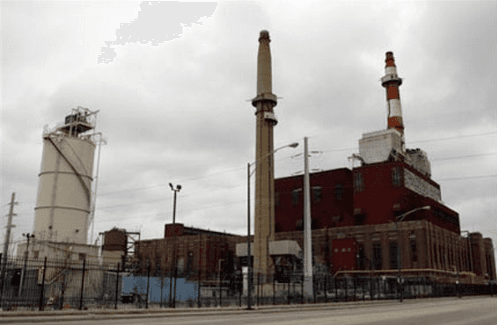New report finds people of color disproportionately harmed by coal-fired power
Crawford Power Plant in Chicago was shut down in August 2012 after years of protests. (Photo courtesy of the University of Chicago.)
Coal-fired power plants can produce dangerous levels of air pollution, and according to a new report published by the National Association for the Advancement of Colored People, low-income communities of color are disproportionately affected.
The report is based on a study by economist Adrian Wilson from the University of Massachusetts at Amherst, sponsored by the NAACP, Little Village Environmental Justice Organization and the Indigenous Environmental Network.
Jacqui Patterson, director of the Climate Justice Initiative at the NAACP, said the report found coal-fired power plants are located disproportionately in low-income communities, and especially in communities of color.
"Not necessarily low-income communities of color, but communities of color in and of themselves," Patterson said. "It’s not always that they’re being built in these communities – often, the plants are already there and the communities come later."
The report looked at 378 coal fired power plants, all those producing at least 100 megawatts.
"Part of the issue there is that the property values are lower in areas where these toxic facilities are, and in fact one recent study I read said that they’re at least 15 percent lower," Patterson said. "When you’re talking about low-income communities or low-wealth communities, those are the areas that they can afford to buy into."
Patterson said sometimes those plants get put in these low-income communities, and in communities of people of color, because they're under-represented and often can't protest as loudly as more affluent communities.
In the report, the 378 power plants are rated A through F, based on sulfur dioxide emission levels, nitrous oxide emissions, proximity to people around the plant, the proportion of people who are of color, and the proportion of people who are low-income.
"A little over 100 got a D or an F, we consider both of those to be failing," she said. "A large number of the failing plants were in the Midwest, particularly in Illinois, Michigan, Ohio, Indiana."
Among the plants scoring worst were the Fisk and Crawford plants in Chicago, which closed between the time the research was conducted and the report was released this year. Lakeshore Plant in Cleveland also scored poorly, but remains open.
"Some of the toxins that come from these plants such as sulfur dioxide and nitrogen oxide, are tied with various respiratory illnesses," Patterson said. "Mercury has been tied to birth defects, lead has been tied to learning difficulties including attention deficit disorder and so forth."
Patterson said it's impossible to tie a person's asthma, definitively, to their proximity to a power plant, but there are definitely spikes near these coal-fired power plants.
By and large, Patterson and the researchers discovered that residents aren't especially familiar with the risks, or even the proximity, of the power plants.
"One person knew about the plant because her father worked in the plant, she hadn’t heard at all about any particular tie to any illnesses, but she did say that her father died of cancer that they thought potentially had started in his lungs, but he had never smoked a day in his life," she said. "We found a lot of those types of stories where we would got to a community and they’d talk about how half the people in their church were on respirators or half the children in their schools had asthma, but again, never really tied it to a coal plant."
Some 100 coal plants have been shut down in recent years, in part because of mounting environmental pressure, but also because of the increasing economic tilt toward natural gas for fueling power plants.
"Climate change unfortunately disproportionately impacts certain communities. Definitely low-income communities and communities of color as well," Patterson said. "I think the role and the voice of communities that are so affected by this should be in the forefront in terms of talking about solutions and talking about our imperative to act on the most aggressive forms of that solution."
